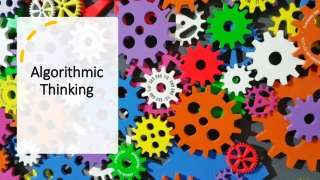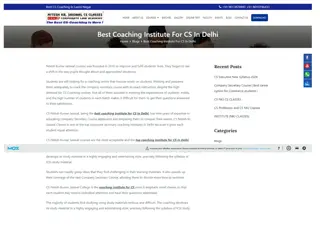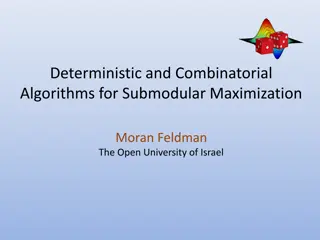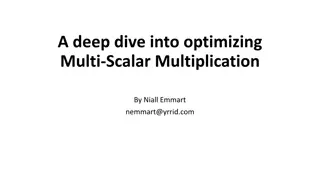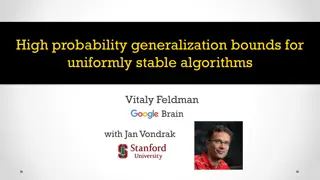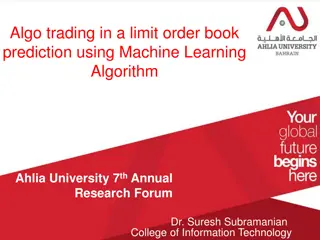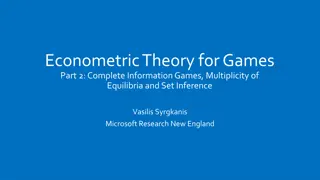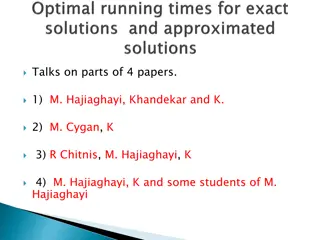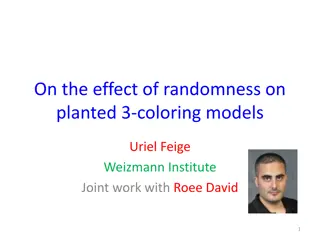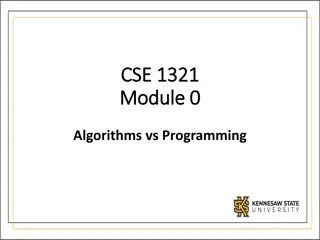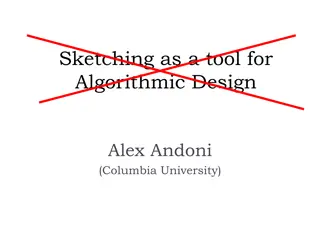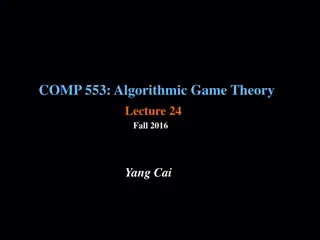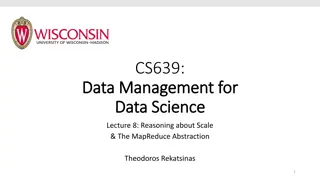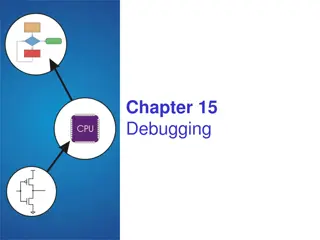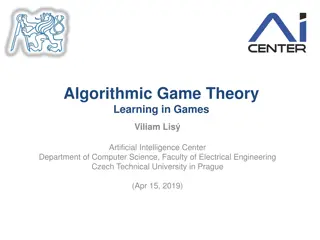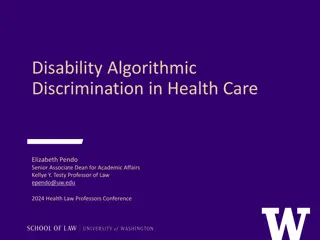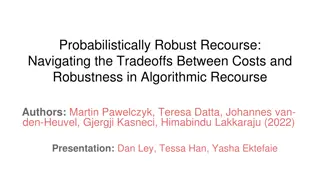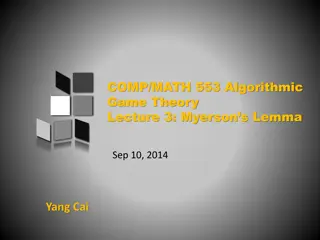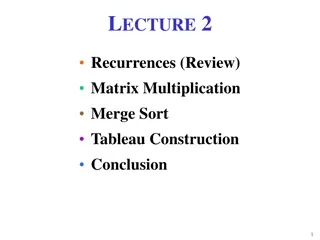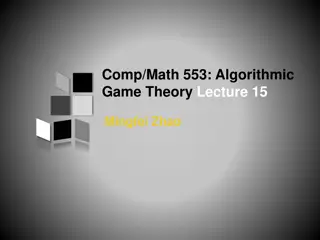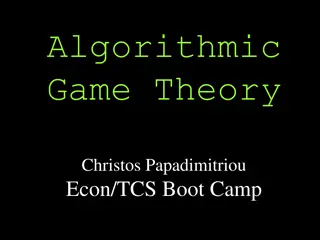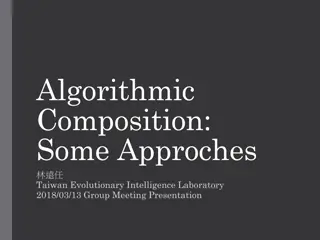Physics Data Processing
The efficient computing and accelerated results in physics data processing, algorithmic design patterns, software infrastructure, and trusted collaboration. Discover the three pillars of Nikhef and the infrastructure for research.
3 views • 15 slides
Understanding Algorithmic Thinking: Key Concepts and Importance
Algorithmic thinking is a crucial skill that involves problem-solving through precisely defined instructions. This competency, applicable beyond computing, entails analyzing problems, identifying steps to solve them, and designing efficient algorithms. The importance of algorithmic thinking lies in
1 views • 13 slides
2024 SEO Trends in New Brunswick: Navigating Evolving Algorithm Changes
In summary, the symbiotic partnership between a New Brunswick SEO specialist and a Microsoft Access expert in NJ is the cornerstone of success in the ever-changing SEO landscape of 2024. Through a meticulous analysis of data and the adept adaptation of strategies, businesses can not only weather alg
0 views • 4 slides
Introduction to Econometric Theory for Games in Economic Analysis
This material delves into the fundamentals of econometric theory for games, focusing on estimation in static and dynamic games of incomplete information, as well as discrete static games of complete information, auction games, and algorithmic game theory. It covers basic tools, terminology, and main
9 views • 31 slides
Expert Strategies for Currency Exchange in 2024
In 2024, expert currency traders are employing advanced strategies like algorithmic trading, sentiment analysis, cross-currency arbitrage, carry trades, and macroeconomic forecasting. By leveraging technology and market insights, these strategies aim to capitalize on opportunities and mitigate risks
1 views • 7 slides
Understanding Recurrence Relations and Applications
Recurrence relations define functions based on previous values and are commonly used in algorithmic analysis. Examples include calculating savings account balances and analyzing binary search algorithms using induction. The concept is further explored in the context of merge sort time complexity.
0 views • 16 slides
CS Executive New Syllabus 2024: Comprehensive Guide and Updates
\"\"\"Embark on a journey of discovery with the CS Executive 2024 Syllabus. Delve into cutting-edge innovations shaping the future of computer science. Explore emerging technologies, algorithmic advancements, and industry trends. Gain insight into the dynamic landscape of modern computing and prepar
1 views • 7 slides
Stay Ahead with the Top CS Coaching Institutes in Delhi 2024
\"Get ahead in the competitive world of computer science with Top CS Coaching Institutes in Delhi. Experience expert guidance, comprehensive study materials, and interactive learning environments tailored to ace coding challenges, algorithmic complexities, and tech interviews. Stay ahead with the be
2 views • 3 slides
Rx for Romance Navigating Doctors Matrimonial Sites
Given the thorough timetables and high-stress conditions specialists frequently face, customary dating can challenge. Doctor Matrimony This guide gives important experiences into the prescribed procedures for making convincing profiles, understanding algorithmic matches, and discussing really with e
1 views • 2 slides
Understanding the Power of Decomposition in Problem Solving
Learn about the concept of decomposition and its importance in problem-solving scenarios in both real-life and Computer Science. Discover how breaking down complex problems into manageable sub-problems can lead to efficient solutions. Explore how decomposition aligns with algorithmic thinking and en
1 views • 11 slides
HotFuzz: Discovering Algorithmic Denial-of-Service Vulnerabilities
A detailed exploration of algorithmic complexity bugs and insight into distributed micro-fuzzing methods. The study uncovers vulnerabilities through guided micro-fuzzing approaches, emphasizing the importance of AC bug detection and fuzz testing techniques such as seed inputs, fuzz observations, and
0 views • 14 slides
Understanding the Right to an Explanation in GDPR and AI Decision Making
The paper delves into the necessity for Explainable AI driven by regulations such as the GDPR, which mandates explanations for algorithmic decisions. It discusses the debate surrounding the existence of a legally binding right to explanation and the complexities of accommodating algorithmic machines
0 views • 22 slides
Submodular Maximization Algorithms Overview
This article discusses deterministic and combinatorial algorithms for submodular maximization, focusing on their applications in various fields such as combinatorics, machine learning, image processing, and algorithmic game theory. It covers key concepts like submodularity, examples of submodular op
0 views • 25 slides
Optimizing Multi-Scalar Multiplication Techniques
Delve into the world of optimizing multi-scalar multiplication techniques with a focus on improving performance, especially in Zero Knowledge Proofs systems using elliptic curves. Explore algorithmic optimizations like the Bucket Method by Gus Gutowski and learn about the runtime breakdown, motivati
3 views • 52 slides
Evolution of Algorithms and Computer Science Through History
The history of algorithms and algorithmic thinking dates back to ancient times, with the development of general-purpose computational machines by Charles Babbage in the 19th century marking a significant advancement. The term "computer science" emerged in 1959, encompassing theoretical computer scie
1 views • 39 slides
Understanding Stability and Generalization in Machine Learning
Exploring high probability generalization bounds for uniformly stable algorithms, the relationship between dataset, loss function, and estimation error, and the implications of low sensitivity on generalization. Known bounds and new theoretical perspectives are discussed, along with approaches like
0 views • 8 slides
Computational Thinking, Algorithms & Programming Overview
This unit covers key concepts in computational thinking, including decomposition, abstraction, and algorithmic thinking. Decomposition involves breaking down complex problems, abstraction focuses on identifying essential elements, and algorithmic thinking is about defining clear instructions to solv
1 views • 5 slides
Machine Learning Framework for Algo Trading in Limit Order Book Prediction
Explore the use of machine learning algorithms for predicting market trends in a limit order book setting. Financial exchanges rely on transparent systems like the Limit Order Book to match buy and sell orders efficiently. Researchers have delved into using deep learning and statistical methods to f
0 views • 16 slides
Econometric Theory for Games: Complete Information, Equilibria, and Set Inference
This tutorial series discusses econometric theory for games, covering estimation in static games, Markovian dynamic games, complete information games, auction games, algorithmic game theory, and mechanism design. It explores topics like multiplicity of equilibria, set inference, and mechanism design
2 views • 23 slides
Understanding Algorithmic Thinking in Digital Systems
Explore the application of algorithmic thinking in digital systems through the journey of Mike Clapper, the Executive Director of AMT. Learn about recognizing patterns in data, creating algorithms to solve problems, and utilizing information systems creatively. Enhance your knowledge of digital syst
0 views • 56 slides
Insights into Advanced Algorithmic Problems
Delve into discussions surrounding complex algorithmic challenges, such as the limitations in solving the 3-SAT problem within specific time bounds, the Exponential Time Hypothesis, proving lower bounds for algorithms in various scenarios, and exploring approximation ratios in algorithm design. Thes
1 views • 65 slides
Divide and Conquer Algorithm Explained
Divide and Conquer algorithm involves dividing a problem into smaller sub-problems, solving them, and combining the solutions to solve the original problem efficiently. The concept is explained through examples of finding maximum and minimum elements in a set, and a detailed algorithmic approach is
1 views • 22 slides
Exploring the Impact of Randomness on Planted 3-Coloring Models
In this study by Uriel Feige and Roee David from the Weizmann Institute, the effect of randomness on planted 3-coloring models is investigated. The research delves into the NP-hard nature of 3-coloring problems, introducing a hosted coloring framework that involves choices like the host graph and th
0 views • 55 slides
Understanding Algorithms and Programming: A Visual Introduction
Explore the fundamental concepts of algorithms and programming through visual representations and practical examples. Learn about algorithmic thinking, abstraction, recipe-like algorithms, and the importance of logical steps in accomplishing tasks. Discover how algorithms encapsulate data and instru
1 views • 17 slides
Sketching as a Tool for Algorithmic Design by Alex Andoni - Overview
Utilizing sketching in algorithmic design, Alex Andoni from Columbia University explores methodologies such as succinct efficient algorithms, dimension reduction, sampling, metric embeddings, and more. The approach involves numerical linear algebra, similarity search, and geometric min-cost matching
0 views • 18 slides
Algorithmic Issues in Tracking: A Deep Dive into Mean Shift, EM, and Line Fitting
Delve into algorithmic challenges in tracking tasks, exploring techniques like mean shift, Expectation-Maximization (EM), and line fitting. Understand the complexities of differentiating outliers and inliers, with a focus on segregating points into best-fit line segments.
0 views • 44 slides
Understanding Greedy Algorithms in Algorithmic Design
Greedy algorithms in algorithmic design involve making the best choice at each step to tackle large, complex problems by breaking them into smaller sub-problems. While they provide efficient solutions for some problems, they may not always work, especially in scenarios like navigating one-way street
2 views • 9 slides
Enhancing Algorithmic Team Formation Through Stakeholder Engagement
Integrating stakeholder voices is crucial in algorithmic team formation to ensure a positive team experience, quality outcomes, and high performance. This research explores learner-centered approaches and considers various team formation methods, highlighting their strengths and weaknesses in educat
0 views • 37 slides
Understanding Brouwer's Fixed Point Theorem and Nash's Proof in Algorithmic Game Theory
Explore the foundational theorems of Brouwer and Nash in Algorithmic Game Theory. Dive into Brouwer's Fixed Point Theorem, showcasing the existence of fixed points in continuous functions. Delve into Nash's Proof, unveiling the Nash equilibrium in game theory. Discover visualizations and constructio
0 views • 23 slides
Understanding Scalability and Algorithmic Complexity in Data Management for Data Science
This lecture delves into the concept of scalability in data management for data science, covering operational and algorithmic aspects. It discusses the importance of efficient resource utilization, scaling out to multiple computing nodes, and managing algorithmic complexity for optimal performance i
0 views • 47 slides
Proposal for Directive to Enhance Working Conditions in Platform Work
The proposal aims to address challenges in platform work, including employment status classification and algorithmic management issues. It seeks to improve transparency, fairness, and accountability in algorithmic decision-making, correctly determine employment status, enhance transparency in platfo
0 views • 13 slides
Understanding Debugging in High-Level Languages
Debugging in high-level languages involves examining and setting values in memory, executing portions of the program, and stopping execution as needed. Different types of errors – syntactic, semantic, and algorithmic – require specific debugging approaches. Syntactic errors are related to code l
0 views • 9 slides
Algorithmic Game Theory Learning in Games by Viliam Lis
The content discusses the concept of algorithmic game theory learning in games, covering topics such as online learning, prediction, best response dynamics, and convergence to Nash equilibrium. It explores how simple learning agents achieve equilibrium outcomes and the application of algorithms in v
0 views • 23 slides
Algorithmic Discrimination in Health Care: Protecting Vulnerable Patients
Elizabeth Pendo and Jennifer D. Oliva discuss disability discrimination in health care algorithms, advocating for legal protections under Section 504, ADA, and ACA. Their article proposes strategies to combat algorithmic bias and enhance antidiscrimination efforts in the 2024 Section 1557 final rule
0 views • 13 slides
Navigating Tradeoffs in Algorithmic Recourse: A Probabilistic Approach
This paper introduces PROBE, a Probabilistically Robust Recourse framework allowing users to balance cost and robustness in algorithmic recourse. Users can choose the recourse invalidation rate, enabling more tailored and efficient recourse management compared to existing methods. PROBE enhances cos
0 views • 17 slides
Understanding Myerson's Lemma in Algorithmic Game Theory
Myerson's Lemma is a fundamental concept in algorithmic game theory, particularly in the context of Sponsored Search Auctions. This lecture delves into the application of Myerson's Lemma to ensure truthful bidding as a dominant strategy, maximize social welfare, and maintain polynomial running time
0 views • 19 slides
Understanding Algorithmic Complexity Measures and the Master Method
In this study, we explore key concepts in algorithmic complexity, including recurrences, matrix multiplication, merge sort, and tableau construction. We delve into the Master Method for solving recurrences, examining Cases 1, 2, and 3, and providing solutions for each scenario. Additionally, we disc
0 views • 61 slides
Algorithmic Game Theory Lecture on Prophet Inequality and Auction Design
In this lecture on Algorithmic Game Theory, Mingfei Zhao discusses the Prophet Inequality and its application to single-item auctions. The lecture covers the concept of Prophet Inequality, strategies to guarantee expected payoffs, and different auction designs such as the Bulow-Klemperer Theorem and
0 views • 10 slides
Evolution of Algorithmic Game Theory in Computer Science
The evolution of Algorithmic Game Theory (AGT) in the realm of Computer Science showcases the intersection of economics and theoretical computation. Before 1995, notable researchers like von Neumann and Megiddo laid the foundation for AGT. Concepts such as computation as a game, bounded rationality,
0 views • 62 slides
Exploring Algorithmic Composition Techniques in Music Generation
Algorithmic composition involves the use of algorithms to create music, mimicking human composers by generating music based on specific rules and structures. This presentation delves into various approaches such as DeepBach, MuseGAN, and EMI, highlighting the use of evolutionary algorithms, machine
0 views • 35 slides

